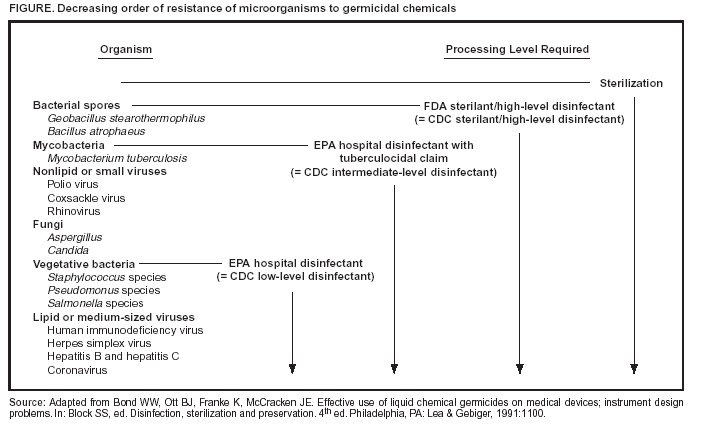Results 1 to 10 of 40
Thread: A final word on sterilization
Threaded View
-
03-14-2009, 05:09 AM #1Member

- Join Date
- Feb 2009
- Posts
- 39
Thanked: 7 A final word on sterilization
A final word on sterilization
Hi all,
Wasn't sure where to put this but given that cleaning is mentioned for this sub-forum I figured I'd put it here and mods can move it if need be.
In trying to learn more I've read the numerous, conflicting, contradictory, and often downright wrong comments posted re: razor sterilization on this and several other boards. And while I agree that it's a matter of preference, I figured I'd post both the CDC & EPA's spectrum which correlates pathogens and level of disinfection necessary:

And also the link (already posted in another) of the comprehensive list of products meeting these requirements in each of the levels:
Antimicrobial Products that Address TB, HIV-1, and Hep B Virus
Now, how far you want to go is up to you but from assessing these, it would seem that if you just want to addres your most common baddies all you need to do is straight ethanol (70%; sold in stores as Ethyl Alcohol) or common household cleaners (Fantastik, 409, Clorox w/o Bleach, Clorox Disinfecting Wipes) that contain Alkyl Dimethyl Ethylbenzyl Ammonium Chloride/Alkyl Dimethyl Ethyl Ammonium Chloride (>.105%) or Hydrogen Peroxide (>0.5%; if you buy in stores, the USP designation means 3.0% so you're good).
Let me say this clearly - ALL of these three will act as INTERMEDIATE-level disinfectants meaning they address TB, Hep, HIV, and your other major concerns...the only ones not addressed by this are the Bacterial Spores in our diagram above. And if you are worried about these, switch to DE, take your razor to a dentist or surgeon and ask them to Autoclave it (or autoclave just your razor's blade, and re-scale it with NEW scales)
Now then, to break it down to a simple regimen that will assuage all the paranoid ones out there I've come up with 2 simple regimens which you can use based on what you have laying around:
Method 1:
1. Soak in Ethyl Alcohol (70%), 10 mins
2. Soak in Hydrogen Peroxide USP (3%), 10 mins
3. Rinse under extremely hot water.
Method 2:
1. Wipe with Clorox/CVS/(Whatever brand as long as it has the active Ammonium Chloride listed above and EPA registration numbers on the back) Disinfecting wipes, THOROUGHLY, and allow to air dry.
-If you have a spray, thoroughly spray down the razor, allow to sit for a few minutes (10?) and wipe clean.
2. Rinse under extremely hot water.
Please feel free to use this as a rough guideline and modify, I just wanted to put a definitive thread out there with facts to back up the point that a simple disinfection process with what you have around your medicine cabinet should do the trick for 99% of your common concerns! (And I apologize if people think this is adequately covered in other threads but the info was useful to me and I wanted to compile it in case anyone else could use it)
Disclaimer: If you use my methods and do end up getting something I accept no responsibility. The content presented herein is informational only and is not professional disinfection advice. It is merely a compilation of information from other sources and should be treated as such. If you have doubts, do your own research and develop your own routine. This guide is provided for convenience and I am not responsible for anything you do with the information, it is your responsibility to be absolutely certain that you have adequately disinfected YOUR razor to YOUR satisfaction.
-
The Following 7 Users Say Thank You to Sansnom For This Useful Post:
antioch510 (03-17-2009), BeBerlin (03-14-2009), darrensandford (03-15-2009), David (03-16-2009), muddy250 (03-15-2009), Rajagra (03-14-2009), str8dave (02-11-2011)


 LinkBack URL
LinkBack URL About LinkBacks
About LinkBacks






 Reply With Quote
Reply With Quote